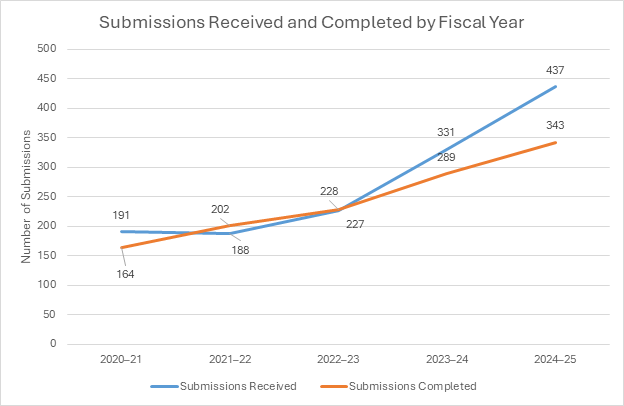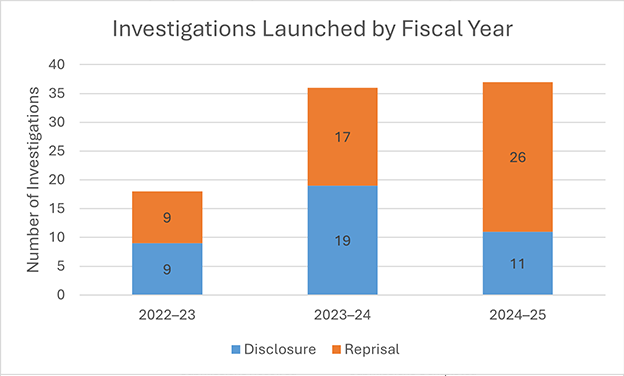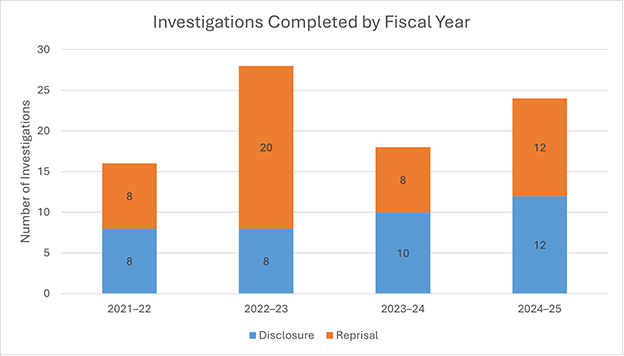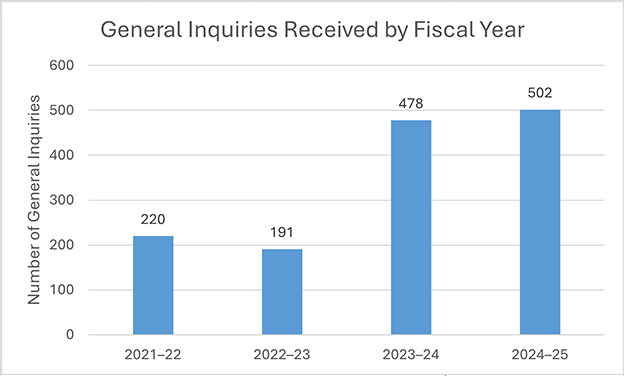2024–25 Annual Report
ISSN 1925-7732
Click to view the report in PDF.
Letters
The Honourable Raymonde Gagné, Senator
Speaker of the Senate
Senate of Canada
Ottawa, Ontario K1A 0A4
Dear Speaker:
I have the honour of presenting you with the Office of the Public Sector Integrity Commissioner of Canada’s Annual Report for the fiscal year ending March 31, 2025. This report is to be laid before the Senate in accordance with the provisions of section 38 of the Public Servants Disclosure Protection Act.
The Annual Report is to be referred to the Standing Senate Committee on National Finance pursuant to subsection 38(4) of the Act.
Yours sincerely,
(Original signed by) Harriet Solloway
Public Sector Integrity Commissioner
Ottawa, June 2025
The Honourable Francis Scarpaleggia, M.P.
Speaker of the House of Commons
House of Commons of Canada
Ottawa, Ontario K1A 0A6
Dear Speaker:
I have the honour of presenting you with the Office of the Public Sector Integrity Commissioner of Canada’s Annual Report for the fiscal year ending March 31, 2025. This report is to be laid before the House of Commons in accordance with the provisions of section 38 of the Public Servants Disclosure Protection Act.
The Annual Report is to be referred to the Standing Committee on Government Operations and Estimates pursuant to subsection 38(4) of the Act.
Yours sincerely,
(Original signed by) Harriet Solloway
Public Sector Integrity Commissioner
Ottawa, June 2025
Public Servants Disclosure Protection Act
The federal public administration is an important national institution and is part of the essential framework of Canadian parliamentary democracy. It is in the public interest to maintain and enhance public confidence in the integrity of public servants. Confidence in public institutions can be enhanced by establishing effective procedures for the disclosure of wrongdoings and for protecting public servants who disclose wrongdoings, and by establishing a code of conduct for the public sector. Public servants owe a duty of loyalty to their employer and enjoy the right to freedom of expression as guaranteed by the Canadian Charter of Rights and Freedoms and that this Act strives to achieve an appropriate balance between those two important principles.
— Excerpt from the Preamble
Our Raison d’Être
Established in 2007 under the Public Servants Disclosure Protection Act, the Office of the Public Sector Integrity Commissioner of Canada (the Office) is an independent organization that strengthens accountability in the federal public sector. It investigates and exposes major wrongdoing through reports to Parliament, and investigates complaints of reprisal.
Our Vision
A premier investigative and decision-making body, known for its impartiality and fairness, the Office acts as an agent of Parliament in the public interest to expose major wrongdoing in the federal public sector.
Our Values
- Respect for Democracy: We recognize that elected officials are accountable to Parliament, and ultimately to the Canadian people, and that a non-partisan public sector is essential to our democratic system.
- Respect for People: We treat all people with respect, dignity and fairness. This is fundamental to our relationship with the Canadian public and colleagues.
- Impartiality: We arrive at impartial and objective conclusions and recommendations independently.
- Integrity: We act in a manner that will bear the closest public scrutiny.
- Stewardship: We use and care for public resources responsibly.
- Excellence: We strive to bring rigour and timeliness as we produce high-quality work.
- Confidentiality: We abide by our confidentiality obligations under the law.
Commissioner’s Message

Commissioner
I am honoured to be entrusted with an important part of the accountability framework for the federal public sector, and I am pleased to present the 2024–25 Annual Report for the Office of the Public Sector Integrity Commissioner of Canada (the Office). This report highlights the achievements and challenges of my first full fiscal year as Commissioner. I am grateful for the support that I have received from the team of dedicated professionals who work tirelessly to fulfill our mandate.
The Office is an independent and impartial agent of Parliament that investigates and exposes major wrongdoing in the federal public sector through reports to Parliament that are released to the public. It also investigates complaints of reprisal against public servants and former public servants who have made a disclosure of wrongdoing or participated in an investigation. We are committed to doing our part to maintain public trust in government institutions.
We strive to ensure that every submission is dealt with in a timely manner, both at the admissibility analysis stage where I must determine whether an investigation is warranted and during an investigation. Investigations are complex. The Office must respect the rights of all involved, including giving consideration for the positions of each party. In cases of alleged wrongdoing, the evidence must be weighed against the burden of proof of “a balance of probabilities.” Whether or not a disclosure or reprisal complaint is investigated, every individual receives a fulsome response, including a reasoned explanation of the outcome. Much of this is unseen by the public yet constitutes a substantial part of our work.
In 2024–25, the skyrocketing increase in submissions to the Office that began in 2023, continued. We experienced a doubling in the number of submissions in comparison to the relatively stable levels leading to 2022–23, with the rate continuing to increase into the next fiscal year with no plateau in sight. I believe that the unprecedented number of submissions indicates that more public servants are becoming aware of and placing their trust in the Office to deal with their concerns, and perhaps most importantly, that they care about integrity in the public sector. We thank all disclosers and complainants for being active participants in the accountability framework.
At the same time, I am mindful that in many cases, the acute shortage of resources is impeding the Office from being able to deliver responses expeditiously as required under the Public Servants Disclosure Protection Act (the Act) and to which all those involved are entitled. The Office’s budget has not kept pace with the surge in cases, further widening the gap between demand and resources, as well as putting at risk the Office’s ability to fulfill our statutory mandate. Delays in investigations and reporting wrongdoing to Parliament continue to mount, as do investigations into complaints of reprisal against whistleblowers. As time passes, investigations become more challenging as evidence and memories fade, while wrongdoing and reprisal continue to occur without consequence. This impacts confidence in the public sector, as well as impacting individuals directly involved in files including those who have suffered reprisal and those who may be living under the cloud of an accusation investigation and who may not be guilty of wrongdoing.
In response to this challenge, during 2024–25, the Office took a number of steps to mitigate the risk to our mandate including: reviewing processes and leveraging technology to gain efficiencies; deferring essential non-staff costs to the next fiscal year to enable the onboarding of additional investigators, analysts and lawyers; cutting discretionary training for staff for a full fiscal year; curtailing travel for investigations for cases arising outside of the National Capital Region; and eliminating services that are not specifically mandated under the Act. Despite unprecedented productivity gains, the Office’s ability to fulfill all statutory obligations remains in jeopardy, particularly with regard to significant delays impacting a number of files. In addition, regular cycle and off-cycle budget requests were submitted, resulting in some additional funding that fell far short of needs.
Productivity gains in several core functions can be seen in the graphs below. For example, in 2024–25, the analysis of 343 cases was completed, representing an increase of 19% over the previous fiscal year. In any other year, this level of productivity would have dealt with all submissions, as well as any backlog that might have existed. Yet, due to an increase in the number of submissions received from 332 to 437, the Office continued to accumulate a backlog.

Text version
The image is a line graph titled "Submissions Received and Completed by Fiscal Year." It displays data across five fiscal years, from 2020–21 to 2024–25, with the x-axis representing the fiscal years and the y-axis showing the number of submissions, ranging from 0 to 500.
Two lines are plotted:
A blue line for "Submissions Received"
An orange line for "Submissions Completed"
Data points by fiscal year:
2020–21: 164 received, 191 completed
2021–22: 188 received, 202 completed
2022–23: 227 received, 228 completed
2023–24: 331 received, 289 completed
2024–25 (projected): 437 received, 343 completed
The graph shows a general upward trend in both received and completed submissions, with received submissions increasing more sharply in the last two years.
Similarly, more investigations were launched in 2024–25 than in any other previous fiscal year. Launches increased from 18 in 2022–23 to 37 in 2024–25.

Text version
The image is a bar chart that displays the number of investigations launched over three fiscal years: 2022–23, 2023–24, and 2024–25. The y-axis represents the number of investigations, ranging from 0 to 40. Each bar is split into two colored segments:
Blue for "Disclosure" investigations
Orange for "Reprisal" investigations
Data by Fiscal Year:
2022–23:
Disclosure: 9
Reprisal: 9
2023–24:
Disclosure: 19
Reprisal: 17
2024–25:
Disclosure: 11
Reprisal: 26
The chart shows a significant increase in both types of investigations in 2023–24, with a notable rise in reprisal investigations in 2024–25.
There has been a 33% increase in completed investigations from 2023–24 to 2024–25.

Text version
The image is a bar chart that shows the number of investigations completed over four fiscal years: 2021–22, 2022–23, 2023–24, and 2024–25. The y-axis represents the number of investigations, ranging from 0 to 30. Each bar is split into two colored segments:
Blue for "Disclosure" investigations
Orange for "Reprisal" investigations
Data by Fiscal Year:
2021–22:
Disclosure: 8
Reprisal: 8
2022–23:
Disclosure: 8
Reprisal: 20
2023–24:
Disclosure: 10
Reprisal: 8
2024–25:
Disclosure: 12
Reprisal: 12
The chart highlights a spike in reprisal investigations completed in 2022–23, followed by a more balanced distribution between disclosure and reprisal investigations in 2024–25.
Also, the number of general inquiries has grown from 220 in 2021–22 to 502 in 2024–25.

Text version
The image is a bar chart that displays the number of general inquiries received over four fiscal years: 2021–22, 2022–23, 2023–24, and 2024–25.
The y-axis is labeled "Number of General Inquiries" and ranges from 0 to 600, in increments of 100.
The x-axis lists the four fiscal years.
Each year is represented by a single blue bar indicating the number of inquiries received.
Data by Fiscal Year:
2021–22: 220 inquiries
2022–23: 191 inquiries
2023–24: 478 inquiries
2024–25: 502 inquiries
The chart shows a sharp increase in general inquiries starting in 2023–24, more than doubling compared to the previous year, and continuing to rise in 2024–25.
In addition to the insufficient budget allocated to the Office, over 2024–25 I have observed an anomaly between the budget process with which the Office must comply and my role as an independent agent of Parliament. While we participate in the budget process that applies to government programs falling under its discretion, our mandate remains constant and continues to be entrusted by the whole of Parliament. In terms of independence as a core tenet of our mandate, the Office’s role is akin to that of the Parliamentary Budget Officer and the Conflict of Interest and Ethics Commissioner, whose budgets are determined by a process that is entirely under the control of Parliament and parliamentary officials. One possible model to reinforce the independence of the Office would be to submit a proposed budget to the Speakers of the Senate and the House of Commons who, after scrutinizing the proposal, would transmit the approved budget to the President of the Treasury Board who would include it without amendments in the Estimates for that fiscal year. This would bring transparency, ensure parliamentary control and shield the process from the possible perception of executive influence.
Case Report
In May 2024, I tabled a Case Report following an investigation into allegations of wrongdoing at the Parole Board of Canada (PBC). Following a disclosure, the Office investigated whether a Board Member seriously breached a code of conduct when he repeatedly harassed women in the workplace. The Office also investigated PBC management for their failure to take adequate action to stop the Board Member’s behaviour.
The investigation determined that the Board Member did, in fact, seriously breach the Values and Ethics Code of the Public Sector and the Board Member’s Code of Professional Conduct, and that management’s inaction amounted to gross mismanagement and created a substantial and specific danger to the health and safety of public servants at the PBC.
All public servants must abide by the Values and Ethics Code of the Federal Public Sector, as well as the values and ethics codes that govern their workplaces. In this case, an individual in a position of power demonstrated a complete lack of respect for others, in direct violation of the codes. The situation was made worse when those in a position to stop it did not protect the public servants who were repeatedly mistreated and harassed. This Case Report highlights the importance of accountability and the crucial role that management plays in ensuring unacceptable behaviour is stopped.
Looking to the Future
In the coming fiscal year, the Office will continue to explore opportunities to gain efficiencies and improve productivity. Without a significant injection of resources, however, the risks to our ability to meet all statutory obligations and to fulfill our mandate will remain in jeopardy.
Operational Activities in 2024–25
Summary of New Activities
| Number of general inquiries received | 502 |
|---|---|
| Number of new disclosures of wrongdoing received | 348 |
| Number of new reprisal complaints received | 89 |
Overall Disclosure Activities
| Total number of disclosures of wrongdoing processed in 2024–25 | 450 |
|---|---|
| 348 |
| 102 |
| Number of files completed following an analysis | 250 |
| Number of investigations launched | 11 |
| Number of files resulting in a founded case of wrongdoing | 1 |
| 4 |
| 2* |
| 7* |
*Note: Recommendations made in a Case Report are followed up on after six months. The number of follow-ups made by the Office and recommendations actioned by Chief Executives includes our Case Report tabled in March 2024, which was reported in the 2023–24 Annual Report.
Overall Reprisal Activities
| Total number of reprisal complaints processed in 2024–25 | 111 |
|---|---|
| 89 |
| 22 |
| Number of files completed following an analysis | 93 |
| Number of investigations launched | 26 |
| Number of files settled through conciliation | 4 |
| Number of applications to the Tribunal | 2 |